- Open Hours : Mon-Sat 9:30am-5:30pm
Licenses And Certifications
Get a Free Estimate or Schedule an Appointment
Expert Solutions for Your Business Growth & Compliance. Let’s Discuss How We Can Help You Succeed.

Digital Signature
A digital signature is a cryptographic method that verifies the authenticity and integrity of a digital message or document, acting as the digital equivalent of a handwritten signature or stamped seal. A digital signature is created using a private key (known only to the signer) and a public key (available to anyone). The signer uses their private key to encrypt a hash (a unique “fingerprint”) of the document’s content, creating the digital signature. Anyone can verify the signature by using the signer’s public key to decrypt the hash and compare it to a new hash of the document. It is used to electronically signing PDF documents, electronically signing contracts and agreements, verifying software integrity, validating online transactions.
Labour License (State and Central)
Businesses or Companies employing contract labour or acting as contractors need to obtain a labour license, which can be either a state or central license depending on the nature of the work and the number of employees. If your business operates across multiple states or has specific requirements under central labour laws, you might need a license from the central government. If the business operates within the state of Kerala, you will likely need a license from the Kerala state labour department. The primary legislation governing the employment of contract labour is the Contract Labour (Regulation and Abolition) Act, 1970. This licensing system is to regulate the employment of contract labour and improve their working conditions and benefits. It ensures that employers comply with labour laws and provide fair treatment to their workers. This license is mandatory for contractors who are Individuals or companies supplying workers to establishments and employers who are establishments employing contract labour.
FSSAI License
FSSAI license is a significant license that every person or entity involved in the food business must have. The FSSAI is the authority that regulates the safety, standards and hygiene of the food industry in India. FSSAI stands for the Food Safety and Standards Authority of India. It is an autonomous body under the Ministry of Health and Family Welfare, responsible for setting and enforcing food safety and standards in India. It was established under the Food Safety and Standards Act, 2006, which consolidates various acts and orders related to food safety. FSSAI sets science-based standards for food products.
Import-Export Code (IEC)
The Import Export Code (IEC) is a unique alphanumeric code issued by the Directorate General of Foreign Trade (DGFT) for individuals or entities engaging in import or export activities in India. It is a mandatory business identification number required for any person or business engaged in import or export activities in India. The Reserve Bank of India mandates persons or businesses importing or exporting services mention IE Code in foreign remittances in a bank account.
ISO certification
International Organization for Standardization is a non-governmental organization that develops and publishes international standards. ISO certification means an independent organization has verified that a company’s internal systems meet internationally recognized standards for quality, safety, and consistency, demonstrating a commitment to best practices and compliance. ISO certification is beneficial for organizations in various industries seeking to demonstrate their commitment to quality, environmental responsibility, and safety, and can be a requirement for certain contracts or to gain international recognition.
PSARA (Private Security Agencies Regulation Act, 2005) license
A PSARA license is mandatory to start or continue a private security agency in India. PSARA License is issued by the Controlling Authority of the respective state government under whose jurisdiction the agency falls. PSARA license is issued under the Private Security Agencies (Regulation) Act, 2005 which is a vital law in India to regulate private security agencies in India. The act is supported by the Private Security Agencies Central Model Rules, 2006, providing implementation guidelines. It aims to establish standards of professionalism in the security services sector. The PSARA License is valid for 5 years from the date of issuance of the license. Also, the application for renewal of the PSARA License has to be filed 45 days before expiry. If the license expires before renewal, you have to file a fresh application again.
Trade Mark
A trademark can be any word, phrase, symbol, design, or a combination of these things that identifies your goods or services. It is a form of intellectual property that protects the unique identification of a brand or product, such as a logo or a name and distinguishes you from your competitors. A trademark identifies the source of your goods or services. It provides legal protection for your brand. It helps business to guard against counterfeiting and fraud. Trademarks are protected by law, and unauthorized use can lead to legal action. The Trade Marks Registry (TMR) in India will receive and process applications for the registration of trade marks under the Trade Marks Act, 1999
